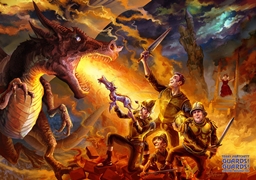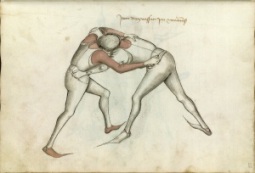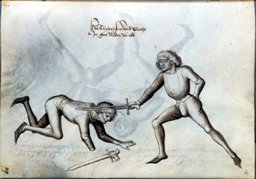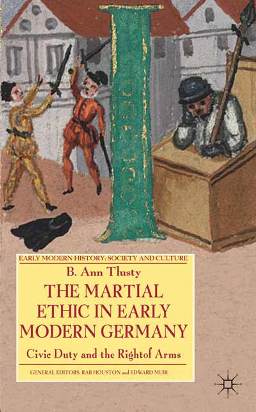An Adventurer’s Guide to the Middle Ages: Town Watch? Where?

The first thing that Conan — or Locke Lamora, or Grey Mouser, or Vimes, or a D&D party — would notice about a real medieval city would be the almost total absence of an Ankh Morpork-style town watch.
It’s a stock trope: here come a dozen Keystone Cops town watch in their funny armour, to arrest the drunken barbarian or catch the thief. Only it’s not like that in reality, or at least not quite like that in Later Medieval and Early Modern England, France, and Germany.
That’s not a criticism. Fantasy writers must write what they will. Dickensian thief takers are plausible, and raise themes to do with policing and justice. However, if, like me, you write Historical Adventure Fiction , then you need to know how policing worked because integrity, and because somebody else will know and will gleefully correct you in reviews. (It’s funny when your research is better than theirs though — and the one time I ever answered a review.)
It’s actually quite hard to drill down to D&D level details about the medieval past. Scholars are usually more interested in the development of legal systems and local authority than what happens when Conan gets into a brawl. However, there are a few useful sources: This PhD thesis on trial by battle; The Time Traveller’s Guide to Medieval England: A Handbook for Visitors to the Fourteenth Century (link); The Martial Ethic in Early Modern Germany: Civic Duty and the Right of Arms (link); plus various more antiquarian tomes on my research shelf.
And, there are some surprises beneath the crust of sometimes dry text. Let’s kick off with what every aspiring thief and rogue needs to know…

What happens if you commit a theft or assault in a medieval street during the day?
The locals and bystanders mob you.
In England it’s called “Hue and Cry” and it’s a legal obligation — if somebody shouts for help and nobody comes to their aid, the entire neighbourhood gets fined. Similar laws usually apply elsewhere.
Medieval folk are unbelievably tougher than modern folk. Their version of football is basically parkor-meets-structured-riot. Wrestling is a hobby. In some places, so is fencing with blunt swords or fighting with sticks (and keeping score by the blood on your shirt). In London, though touting a sword around is usually illegal, young men go out at night looking for a sword and buckler skirmish (presumably the swords are blunt, but it’s hard to know for sure). In Germany, the householders are armed to the teeth and can be fined for not having a sword, and there’s a tradition of ad hoc duels. All the men around you wear daggers, in Germany — of course — some have swords, and all of them have some idea of how to use them.
Everybody is usually too busy kicking and punching you to call the watch. If you are a thief they may even hang you on the spot — it’s a legal grey area, but there’s a tradition of lynch justice and nobody gets into trouble for string-up a thief caught red-handed. Eventually, if you’re still alive, they haul you off to the local jail, which in backwater towns may just stocks or a wooden cage (feeling vulnerable yet?). They may actually call the watch at this point, to help with the hauling — we’ll get to them.
Suppose instead you get into a running fight? That’s when people do call the watch, if they haven’t heard the noise and come running. By this time the locals have probably also grabbed sticks and shovels and joined in to protect their property (in Germany, there’s a good chance they’ll have polearms from the neighbourhood armoury — oh yes, they had these …)
The watch, however, only turns out to be between one and six men.
In France in royal domains they are “sergeants“, highly corruptible non-nobles appointed by a scary-by-medieval-standards centralising royal government system, as close to an actual police force as you can get at the time (which is not very).

In England they are actually called “watchmen”, but there are only six for each city gate if you’re in a city, twelve if you are in a borough, six for a town. Some of them are busy guarding the gates or sleeping up prior to a night patrol. London has an additional six per ward, roughly one per four hundred head of population, which gives us a sense of a Wild West sheriff rather than a police officer.
In Germany, a weird patchwork of intersecting states and legislations, it all depends on where you are. However, the daytime watch usually comprises of some mercenaries — probably drunk some of the time, but usually tough and with no local allegiances to muddy the waters — plus local men, usually youths, from respectable households taking their monthly turn.
German watchmen carry halberds or other pole-arms. In a real melee, they’ll draw swords, but a long pole-weapon is surprisingly effective in a narrow street, and they can use the hooked parts to haul people out of fights. They also wear armour, usually breastplates, as a uniform — to go armoured, you must be on watch or militia business; people sometimes end up fighting the watch by accident when they forget their plate.
Whatever their nationality, since they’ll be outnumbered by the brawlers, the first thing the watchmen will do is get help. This means — you guessed it — organising the bystanders. In Germany, all the locals are also in the militia, so if they haven’t already tooled up, some at least will run for proper military weapons. In England and France, there are usually trained fighters within running distance, either a garrison or some lord’s retinue — his servants also know how to fight — or members of the local militia, so the watch might send for them. (Or they might simply stand back and note names.)
Once you’re subdued, it’s off to jail pending some kind of trial. What happens next depends on what the witnesses say and how much collateral damage you caused. (Though if you’re in 15th-century England and a retainer of a great lord, expect to be free by supper time.)
A fair fight with no fatalities and limited damage to property will earn you fines and — for strangers — probably banishment.
Killing or maiming somebody is dicier.

In France and Germany, if you’re not a stranger and it looked like a duel (they don’t call it that for another century or so) then there are fines and pilgrimages, and in Germany the local authorities will make you pay compensation — yes, really old-style weregild — to avert a feud, which would be bad for business and bystanders both. Otherwise expect to be executed or possibly just maimed. England is less forgiving of duelling since it’s a form of private justice, and that challenges the authority of the king. So don’t kill anybody unless you are a noble. If you do kill somebody, don’t get caught, and hope to win a pardon in return for joining the king’s army rampaging around France.

Nobody. (Unless you are in England, when the coroner is supposed to investigate or at least report suspicious deaths. If you find a corpse, you have to call him out so he can note the wounds. All very Ye Olde CSI, but he’s not a trained professional, and there’s probably only one of him plus a servant or two.)
Nothing happens unless somebody accuses you of something.
Well, not quite. The legal system began as really just a non-violent substitute for self-help and feud. This can be a problem if no accusations are forthcoming — being a snitch is dangerous — so the authorities usually have workarounds. In parts of France, a judge can hold an inquest based on presumably confidential witness statements, or imprison you in the hope somebody would come forward. In England, the sheriff routinely calls on juries — really committees — to name notorious criminals and list crimes worth investigating.
So if there’s formal investigating, it’s done by a judge of some kind, or else by a jury. There’s no call for a watchman to turn sleuth, and if he did, nobody would much trust him. Since he’s underpaid they’d — rightly — suspect him of a financial agenda or accuse the authorities of some kind of power play.
They — the rough tough Medieval townsfolk — aren’t sighing and yearning for a proper police force. That would mean giving up traditional rights to self help, and surrendering control to people they don’t trust: namely governments, local or royal, intent on raising taxes and fines — they can always name individuals they don’t trust, so this feels specific to them rather than a political stance; and law enforcement officers on the take, for example the French sergeants were such notorious muggers and extortionists that the king actually had to reduce their numbers within a few decades of founding them!
So, no, you won’t get arrested by Nobby.
Nor will Vimes investigate your misdeeds. (Though in England, a coroner might.)
The local watch are glorified mall cops with perhaps a dose of neighbourhood watch.
However, don’t underestimate the townies. That funny little guy selling candles has a lumpy face because he’s a five time winner of the local longsword tournament.
M Harold Page is a full-time author and part-time swordsman. Drop by his blog to find out what he’s up to…
I’d be much less of a Discworld fan without The Watch.
Yes indeed. As I said, Fantasy writers must write what they will. There’s no rule people have to be historically accurate since they are not writing history.
The maintaining of order in premodern societies is always a very interesting thing. Tribal societies can get quite creative when it comes to dealing with offenders. You can’t detain them and can’t really fine them personally (unless you fine the whole family), and whatever measures you take, you still have to spend the rest of your life with his relatives and friends in a very small village. So it’s generally very hush hush and sometimes troublemakers just disappear and everyone agrees not to look into it any further.
Sounds very Viking!
The concept of minute men in colonial America stemmed from this society you described. It was expected of every able bodied man (even the teenagers) to get their musket and hatchets ready to protect the village. This was a normal expectation. I like the idea because the citizen had a vested interest in law and order and frequently did not look away from trouble.
Wild Ape, part of the reason I joined the National Guard! I really like that “minute man” tradition… although the military takes more than a minute to do anything these days…
My current work in progress demands I’m interested in this topic, but concerning the Roman empire… M. Harold Page, bump into any sources about that?
Love articles like this, and look forward to seeing others!
@Wild Ape – An American friend reckons that the Americans are actually more German than English!
@thehessiangoeshome
Some on Amazon, but expensive academic pieces. I can ask around.
I had to look up Ankh-Morpork. Never read Discworld. Interesting article. Any differences with other peoples besides Western Europeans? What about the Ottoman Empire, Magyars/Hungarians, or Slavs?
@thehessiangoeshome: I’ve gotten some good information out of The Complete Roman Army, by Adrian Godsworthy, published by Thames & Hudson
@MHarold: I believe that what we now think of as a police force began in the 18th century with the work of Sir Robert Walpole and to some extent Henry Fielding
China and Japan are very fascinating when it comes to law enforcement. China never really had “Middle Ages” as we know them in Europe and a functional organized state based on laws and formal education persisted almost continously from ancient times to the present. Imagine if the Roman Empire had never collapsed and was still around.
Not too familiar with the particulars, but as far as I am aware police work was always taken very seriously by the government.
That Time Traveler’s Guide to Medieval England is a great read! Books like that (and this article) overturn quaint notions and conventional wisdom in quite eye-opening ways! At the very least, they get one to stop complaining so much, when one comes to appreciate that one would probably rather be alive now than at any other time in history!
Instant justice-by-by standard still happens in some parts of the world where the police are not respected.
Friends of mine have witnessed beatings and killings of drivers after a road traffic collision led to death or serious injuries. The vehicle drivers were dragged out of their seats and that was them.
Spell checking predictive text….
I meant justice by bystanders and not by standards.
Speaking of corrupt officers and militias, neighborhood protection associations tend to be the most fertile ground for organized crime. Mafia, Yakuza, tongs, and so on all grew out of those. The collapse of communist control in Eastern Europe also lead to similar developments.
When Police does appear or comes back, they generally aren’t too happy about giving back their power.
Let me recommend GURPS Mysteries, which has some discussion of medieval guild justice; and Cumberland Games’ Town and Fief. These are mostly designed for the gamer audience, but have a fair amount of research.
@LJS I’ve heard good things about the GURPs guides. I believe the Arabian Nights one is good.
Love this piece. As to Cpt. Vimes, it’s his effort, spurred by Carrot’s arrival, to turn the Watch into a real police force that forms the great arc of the early books in his arc.
@LJS – Mongooses’ RuneQuest 1st edition (aka RQ4 or MRQ1) had a publication called The Guide to Guilds, Cults & Factions, it’s quite generic and an interesting read.
@Martin – also the Roman Colligeum made so recently notorious by Erastes Suldain in the series Rome.
Great article, certainly has me thinking of some good ideas for my RuneQuest campaign.
@Fletcher – Yes. I think that’s an important point – Fantasy doesn’t need to reflect Medieval history. I do think, though, it’s useful to know what structures were around in pre-modern history.
@Tiberius – Got any good books on Roman policing?
Fletcher – there was also a really good d20 supplment from AEG called ‘Guilds’ that I really liked.
[…] (to stop a theft or assault, perhaps) it is the duty of all bystanders to mob the assailant. In this article debunking the myth of a “town watch” (in standard medieval European fantasy settings) the author cites several sources, and admiringly […]
good stuff, but a couple points: a) fantasy/magic generally would muck up making things too “realistic” to various historical real world places, and b) ” roughly one per four hundred head of population, which gives us a sense of a Wild West sheriff rather than a police officer.” Just how many cops do you think we have around today? the NYPD has 36,000 officers+19,000 civilian employess. the population of NYC is like 8.8 million(1:244). There are 456 police where I live in Windsor, Ontario; population 222,000 (1:487). You aren’t describing a wild west there, but what we’d call “normal”. London now has population of 8.96 million-9.426 million, with about 33,800 cops. 1: 265 to 1: 279 is more, sure, but not that extreme.